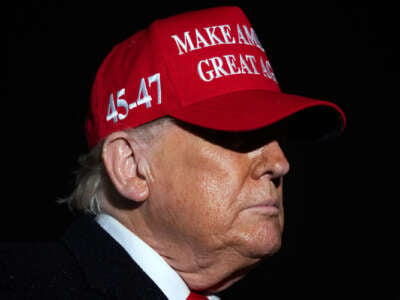The Supreme Court has intervened repeatedly over the past four months to overturn temporary restraining orders (TROs) issued by lower court judges against an array of reckless edicts from Donald Trump and his agents — including the dictates of his then-resident billionaire, Elon Musk. These interventions have allowed a number of press releases dressed up as executive orders to take effect while the litigation against them proceeds.
This is a reversal of the way TROs are supposed to function — to preserve the status quo from irreparable harm while litigation against a new rule or edict is proceeding. In a nutshell, several lower courts have found that plaintiffs suing the Trump administration have proven that they would face irreparable harm if the action were not halted and that they have a substantial likelihood of success under the law, in addition to showing that issuing an injunction or restraining order is in the public interest. While lower courts have made such detailed findings, the Republican-appointed judges on the Roberts Court have set several of them aside.
This Supreme Court majority was made possible by Leonard Leo, the unelected right-wing operative Trump delegated judicial selection to during his first term. Leo handpicked the three people Trump appointed to the U.S. Supreme Court: Neil Gorsuch, Brett Kavanaugh, and Amy Coney Barrett. Together, those three along with three other men Leo helped get confirmed to the Supreme Court — John Roberts, Samuel Alito, and Clarence Thomas — have been on a binge of reversing legal precedents, accomplishing Leo’s long-term agenda and the Republican Party’s goal of overturning Roe v. Wade. The Roberts Court has advanced the legal policy agenda of his billionaire benefactors, including Charles Koch and Barre Seid, by weakening the power of federal agencies to regulate corporations through invented legal “doctrines” like the “major questions” theory and reversing the Chevron deference precedent that prevented judges from easily displacing agency rules. Most significantly, as I detail in my forthcoming book Without Precedent, these Republican appointees to the Supreme Court blocked the criminal prosecution of Trump, paving the way for his return to the White House through Chief Justice John Roberts’ machinations to give the president unprecedented and counterconstitutional immunity from prosecution.
Uncompromised, uncompromising news
Get reliable, independent news and commentary delivered to your inbox every day.
So why has Trump called Leo a “sleazebag”?
Trump is upset that in the lower courts his administration has lost 96 percent of the time so far, according to one analysis. The president’s apologists have asserted that this shows that the courts are biased against Trump. In reality it is the law that is biased against actions that defy the web of statutes, regulations, rules, contracts, and case law that have long been part of our legal system. Trump has even suggested that he may not be bound by the oath he swore on January 20 to uphold the Constitution, which commands the president (twice!) to “faithfully execute” the law — not to kill it, but to effectuate it. Roberts, who administered the oath, had denuded it of much of its power through his orchestration of the outrageous immunity ruling. So much for bias!
Trump, upset that he cannot just act like a king and defy the law at his whim, attacked Leo for not choosing judges who would put loyalty to him above the Constitution. The president wants the courts to resemble his cabinet, peopled with loyalists like Pam Bondi and Kristi Noem who have repeatedly defended assaults on the rule of law and common sense.
However, Trump is far from done doing Leo’s bidding.
Degrading Standards for Judges
In the same week that Trump assailed Leo’s judicial picks, the Trump-controlled Justice Department announced that it would no longer allow judicial nominees to fill out the merit selection evaluation forms of the American Bar Association (ABA) — a long-standing goal of Leo.
One of Leo’s first jobs with the Federalist Society was at a program called “ABA Watch,” set up in 1996 to critique the association. For decades, the ABA has rated federal judicial nominees by evaluating whether in the view of fellow members of the legal bar they have the reputation, skills, devotion to fairness, and temperament to be entrusted with a powerful position as a federal judge. The ABA had given Leo’s buddy, Clarence Thomas, a partial “Not Qualified” rating when he was nominated to the Supreme Court, an evaluation that came well before Anita Hill’s damning testimony that Thomas had engaged in sexual harassment, testimony he hotly denied. That ABA rating was appeared to be based in part on the fact that Thomas had never argued a case before the Supreme Court, had only briefly worked as a judge, and his primary work in the past decade had not been as a litigator in federal or state courts.
After Thomas was confirmed despite the controversy surrounding his nomination, Leo reportedly became the Federalist Society’s first full-time employee since it was launched with the aid of Antonin Scalia and Robert Bork back in 1982 as a student group building a pipeline to power for “conservative and libertarian” lawyers. Leo’s ABA Watch assailed the bar and its role in evaluating judicial nominees while Bill Clinton was president. Then, in 2001, after George W. Bush became president, Leo and his cohorts in the Senate seemingly succeeded in getting the ABA out of the role it had for many years of evaluating judicial candidates before they were nominated — rating their experience and reputation before the bar. That 30-day prenomination evaluation process, which I was a liaison to when I worked on judicial nominations in the Clinton administration, weeded out judicial candidates whom the ABA advised would get a “Not Qualified” (NQ) or partially NQ rating, if they were nominated, because of their lack of experience, poor temperament, or bias. In that administration, we considered the ABA to be an important part of the merit evaluation of candidates for judgeships who were recommended by Democratic and Republican senators and members of Congress, to help ensure they had good reputations and not just good connections.
In 2001, instead of the ABA screening judicial candidates before they were nominated, Leo and the Federalist Society began screening George W. Bush’s potential judicial candidates for their ties to the group and alignment. That screening was so successful for Leo that, when I was the chief counsel for nominations for the chairman of the U.S. Senate Judiciary Committee, I started drafting statements for the Congressional Record documenting how many of Bush’s appellate nominees were tied to the Federalist Society. Kicking the ABA out of the prenomination process, in my view, inflated the ABA’s ratings in some instances for Bush nominees because some people were fearful of being candid about their concerns with someone already nominated by the president and thus likely to be confirmed. Meanwhile, in the early 2000s, Leo also began targeting state merit selection systems for destruction, as Evan Vorpahl and I documented last year in a special report and previously. Leo has been an opponent of merit selection and merit evaluation for more than two decades now. Why would he want anyone other than himself screening people in or out of the bench based on their alignment with his agenda for the law?
Fast forward to 2016 and, as Trump White House Counsel Don McGahn later said, the administration “in-sourced” the Federalist Society to choose Trump’s slate of judges, some of whom have proven to be independent and willing to defend the rule of law and some of whom (like Aileen Cannon, James Ho, and Matthew Kacsmaryk) have seemingly chosen loyalty or advancing an extreme political agenda over the law. Trump 2.0 seems determined to choose more judges of that ilk, evidenced by Trump’s nomination of his criminal defense lawyer Emil Bove and anti-abortion zealot Joshua Divine. In the first Trump term, the ABA continued to give post-nomination ratings and some of Trump’s nominees were so unqualified — including some who were essentially just MAGA bloggers — that they received NQ votes even though the Republican-controlled Senate was unlikely to be critical of Trump nominees.
But this past month, in the midst of Trump’s personal attacks on Leo, Leo got one of his early wishes: The administration announced that the American Bar Association would no longer have any role in the evaluation and Trump judicial candidates would be told not to meet with the ABA or respond to their questions or questionnaires.
That’s certainly a signal that Trump 2.0 nominees will be even more unqualified to be federal judges — and unworthy to be trusted to act with allegiance to the law and fairness rather than loyalty to Trump — as my partner at Court Accountability, Alex Aronson, wrote about recently.
That’s a win for Leo and a loss for the rest of us — because the U.S. needs fair judges, now more than ever.
Urgent appeal for your support: Help us fight political repression.
Truthout urgently appeals for your support. Under pressure from an array of McCarthyist anti-speech tactics, independent journalists at Truthout face new and mounting political repression.
We rely on your support to publish movement journalism — in fact, we’re almost entirely funded by readers like you. Yet, donations are down at this moment of crisis. We may end this month in the red without additional help, so we’ve launched a fundraiser.
We have 5 days to hit our $33,000 goal. Please contribute a tax-deductible gift to Truthout at this critical moment.
Read full article at source
Stay informed about this story by subscribing to our regular Newsletter


